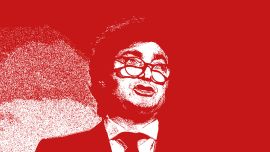Buenos Aires Province Governor Axel Kicillof has opted to go it alone, announcing that he will bring forward this year’s legislative elections in the nation’s key battleground region to September 7.
In doing so, Kicillof, 53, confirms his defiance of his political mentor, former president Cristina Fernández de Kirchner, who had urged him to stage the provincial ballot on the same date as the October 26 national elections.
"I am authorised to fix the date of the provincial elections and I exercise that prerogative, as corresponds to the objective of guaranteeing a serious electoral calendar," the governor said at a press conference on Monday, also announcing that he would be sending a bill to suspend the PASO primaries in the province.
The decision to decouple the provincial vote from this year’s midterms immediately sparked controversy within Peronism, the largest opposition force to President Javier Milei’s government.
As national chair of the Partido Justicialista, the largest party in the opposition coalition, Fernández de Kirchner, 72, had pushed for the region’s elections to remain aligned with the national vote.
Kicillof’s decision to break with his former mentor, in whose 2007-2015 governments he served as economy minister, plants his flag in the battle to lead the opposition, which has lacked leadership and renewal after the devastating 2023 election loss to Milei.
Kirchnerite sources this week described Kicillof’s decision as "suicidal." Some accused the governor of seeking to "split Peronism."
"He’s a Peronist governor who instead of broadening Peronism, divided and split it. Suicidal," a source from Fernández de Kirchner’s entourage told the Noticias Argentinas news agency.
The source described the decision as “unilateral” and said the governor had shifted his position overnight and not notified them prior to his announcement.
In his press conference, Kicillof said his decision had been taken after consultation over the voting process, which he said had led him to the conclusion that staging the two ballots on the same day would produce “chaos” at polling stations.
“Long queues would pile up with overcrowding, it would be hell,” he predicted.
‘Unviable’
Kicillof justified his move with the implementation of a single paper ballot by the national government, declaring that it would be “unviable to vote with two different ballot-boxes and two different ballots."
“We have carried out studies, consultations and simulations and I can tell you that it is unviable to vote this way. It’s like holding two different elections on the same day with a new system,” he argued.
The governor said that the procedure to vote in the polling-booth in two different ballot-boxes would take an average of four minutes per voter, which would delay the entire process.
“I know that some speak of the possibility of doubling the number of polling-booths but that is impossible in Buenos Aires Province where they vote in absolutely inappropriate places, in moving polling-booths,” the governor commented.
For Kicillof, “the conclusion is clear and overwhelming: voting on the same day when combining two different methods would be chaos. I cannot endorse this situation. The only way of assuring that everybody can vote simply is to do it on two different days,” he reaffirmed.
“This is a necessary decision which has been thought through and debated. I insist: we cannot expose our people to a chaotic election, eternal queues, confusion and uncertainty,” he concluded.
‘Unity’
To dispel any doubts, Kicillof assured at his press conference that he would continue working for the "unity" of Peronism. The decision to advance the elections, in no way, meant “ignoring national issues” and the problems of the Milei administration, he insisted.
“I have not come to talk about infighting which belongs elsewhere. But respecting the electoral process, we will continue working for the unity of those of us who oppose the Milei government, convoking as broad a front as possible to represent all those suffering these policies,” he declared.
In response to Kirchnerite questioning of his values, Kicillof emphasised that “to defend the province is to strengthen the national vision.”
“That is what the provincial government does every day, confronting [Milei] to defend the people of the province. Never, not on any day, have we ignored national issues.”

























Comments